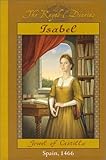 Isabel, Jewel of Castilla
Isabel, Jewel of Castillaby Carolyn Meyer
My rating: 4 of 5 stars
Isabel, Jewel of Castilla / 0-439-07805-9
A solid addition to the Royal Diary series, Isabel deals with the young adulthood of the queen who would later become the patron of Christopher Columbus. The diary centers around the dilemmas that Isabel faces as she chooses which of her two brothers to support as king, and as she hopes to be married to someone who will not be completely repugnant to her. Isabel is forced to grapple with her conscience as she supports one of her brothers over the other in the struggle for the crown, and she poignantly must face her mother's growing madness that prevents her from recognizing her own children. Isabel displays great strength of will as she maneuvers from a position of weakness to broker a marriage that will not shackle her to someone she hates and fears. Courageously, she defies her brother in order to marry the prince she hopes she can love - a bright young man her equal in age and wit - and this gamble of hers ensures her legacy.
This is one of the less quickly paced diaries, partly because Isabel must spend so much time virtually imprisoned by her brother, and yet the potentially exciting scenes of her fleeing for freedom and receiving her bridegroom in secret are passed over quickly and are never dealt on with the detail and attention they deserve. The author also chooses - rather cowardly, I feel - to almost completely dodge the issues which make Isabel most notorious, most notably the Spanish Inquisition, the reign of Torquemada, and the purge of the Jews from Spain. Some of this is hinted at - Isabel has a Jewish friend who has converted to Christianity, but whom she suspects is "forever tainted" simply because of her ancestry. And Isabel briefly is forced to switch confessors from the cruel Torquemada to a moderate, loving priest who admonishes Isabel to worry slightly less about her mortal sins and slightly more about "enjoying God's love".
However, despite these superficial touches, the elephant in the room is completely ignored, and this gives the novel a weird, slanted feel. We are told by the author, both in the novel and the epilogue, that Isabel is a good Christian and is only doing what she thought was God's doing. And yet this claim should be examined, not just taken at face value. Isabel is routinely rebellious against her older brother (and, therefore, against her king), she breaks vows regularly, both to her king and to God, and she almost always does exactly what she wants, without regard for the "holiness" of her actions.
This would work into a wonderful novel, if the author was deliberately underscoring the hypocrisy at work here in Isabel, but I do not think that is what we are seeing here. The author seems to have fallen into the trap of sympathizing too much with her subject and seems to believe that Isabel is guilty of no wrong. It is extremely jarring and disappointing to see, in the Epilogue, the Spanish Inquisition swept under the rug in a few meager sentences, with the benediction that Isabel thought she was doing the right thing. I do believe, however, that this novel can be a perfect staging point to discuss with children the hypocrisy of the Inquisition and the importance of religious freedom from tyranny. Thus, I feel that this book is a solid four star book, despite the sometimes soporific pacing, because the topic is interesting and well-researched and because the hypocrisy of Isabel shine brightly through these pages and provide a valuable lesson to those who would consider the implications.
~ Ana Mardoll
View all my reviews



1 comments:
I agree, Isabella's not my favorite
Post a Comment